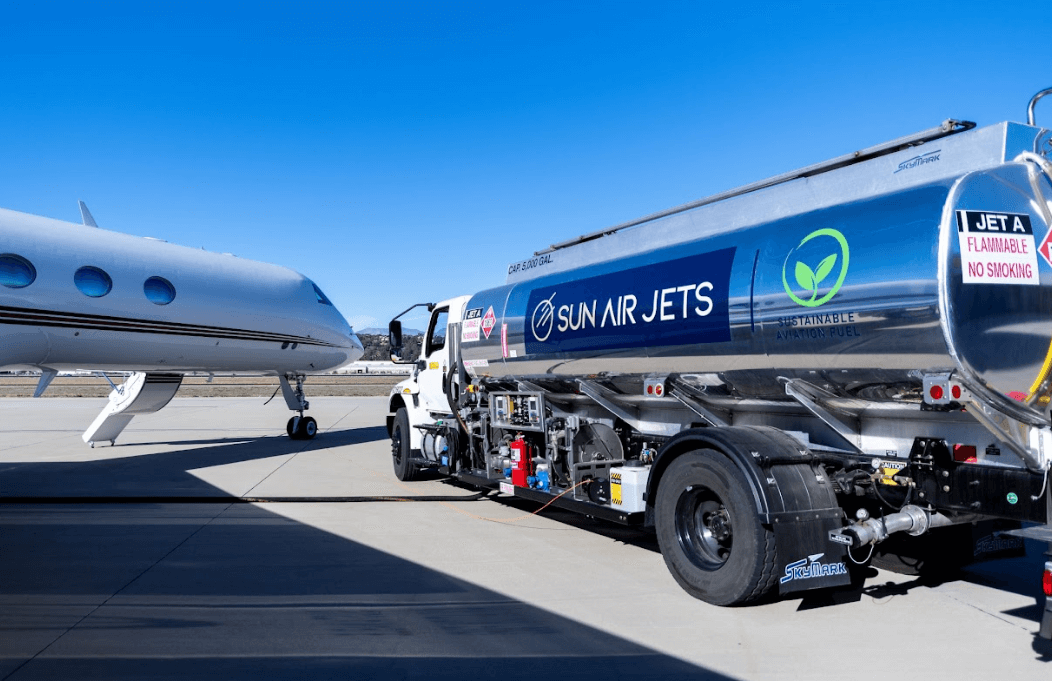It is no secret that air travel emits greenhouse gasses. According to the International Council on Clean Transportation (ICCT), air travel produces about 3% of carbon dioxide emissions on a global scale.
The aviation industry emits carbon dioxide into the air and water vapor, nitrogen oxides, carbon monoxide, soot, and even contrails (the white streak that follows an aircraft). Noise pollution is also a problem.
Since giving up flying isn’t an option, those in the industry are left to find ways to make a difference. Many major commercial airlines and private carriers are taking steps to increase sustainability and become more carbon-neutral. Some have even taken to reducing the use of single-use plastic, minimizing the amount of luggage onboard, etc. While it is much more complicated than most people realize, it can be done.
Sun Air Jets proves it is possible as they have taken steps to ensure sustainable flying practices, both now and in the future. Here’s what they have been up to.
Choosing Sustainable Aviation Fuel
One of the main reasons that air travel affects the environment is the use of jet fuel. It produces a high level of carbon dioxide, and because it spends a lot of time in the atmosphere, it can become even more potent as a greenhouse gas.
Thankfully, the use of alternative fuels has provided air travel with decreased risk to the environment. These fuels are becoming more and more accessible, using organic and renewable materials rather than made from petroleum. However, many airlines hesitate to switch because it often comes with a higher price point.
Sun Air Jets is different. They offer sustainable aviation fuel. This makes it very convenient to make a difference in the environment. And it has allowed them to cut carbon emissions by up to 23%. Sustainable aviation fuel can be used on most jet aircraft.
Sun Air Jets and their clients benefit from the ethical choice to reduce their carbon footprint and use sustainable jet fuel. Everyone wins.
Investing in Carbon Offsetting
Carbon offsetting companies are popping up all over to help reduce carbon emissions. Not sure how it works? It’s easy.
As the term suggests, those engaging in practices they know are unhealthy for the environment can invest in carbon offsets to offset the damage. For instance, eco-conscious travelers who find themselves flying to their destination can do so comfortably when they invest in carbon offsets because they will know that the damage they may cause with their choice of air travel will be counteracted with an act such as planting trees, adding to wind farms, or investing in other renewable energy sources.
More and more companies in the world of aviation are investing in carbon offsetting to make a positive change within the environment. And Sun Air Jets has joined them as part of their sustainability pledge.
Sun Air Jets has partnered with 4AIR, a carbon-offsetting company that funds projects to produce renewable energy and offset greenhouse gases worldwide, such as wind power and landfill gas capture.
Sun Air Jets’ money in carbon offsetting helps balance the damage produced by charter flights. It is one more way they are proving themselves to be a leader in private aviation and sustainable flying.
Choosing the Shortest Flight Times
You want to arrive at your destination as quickly as possible, and your flight crew also wants to get you there as efficiently as possible. But did you know that shaving off just a few minutes from a flight can save 100 kg or more carbon dioxide per flight?
Finding the shortest route to a destination and following the flight pattern is the best way to use fuel wisely with the environment in mind. As the aviation industry grows and evolves, new technology will emerge, giving flight crews an even easier way of finding the best route with the least fuel burned.
A Reduction of Noise Pollution
While it may not have the same impact on our climate as air pollution, noise pollution is still a very invasive issue caused by air travel. Those in aviation try to make strides in harmony with the environment and their neighbors.
Sun Air Jets has committed to the Quieter Nights Program. This keeps everything copacetic at all times. It is no wonder why they continue to prove themselves as leaders in private aviation.
Sustainable Flying Practices
Many in the aviation industry worldwide, commercial and private, have committed to making changes that will positively impact the environment. Over the last couple of years, the world committed to achieving net zero carbon emissions by the year 2050. The idea behind this is that it will reduce global warming significantly and the severity of the damage already caused – and that will be caused should we continue on the same path we are on today.
As tourism and trade continue to push air travel and drive the development of the global economy, action needs to be taken now rather than later. And that’s why Sun Air Jets has taken a stand to do its part in offsetting its emissions and offering sustainable aviation fuel to make sustainable flying possible.
We have one world to explore. The better we care for it, the longer it will care for us. Diving head first into sustainability efforts and offering sustainable aviation fuel, efficient flight routes, carbon offsetting, and even noise reduction, Sun Air Jets are making a difference and setting the example for other private jet companies. And by choosing them as your preferred private jet charter company, you are participating in this positive change.
